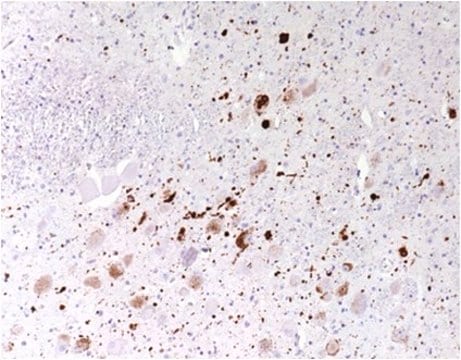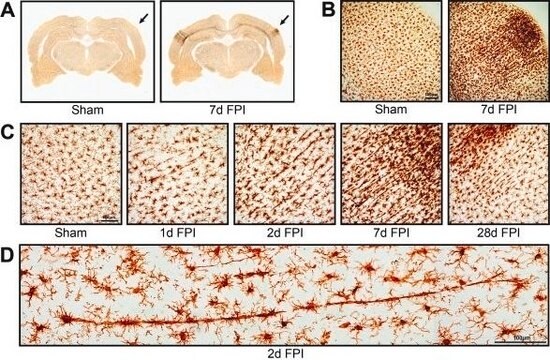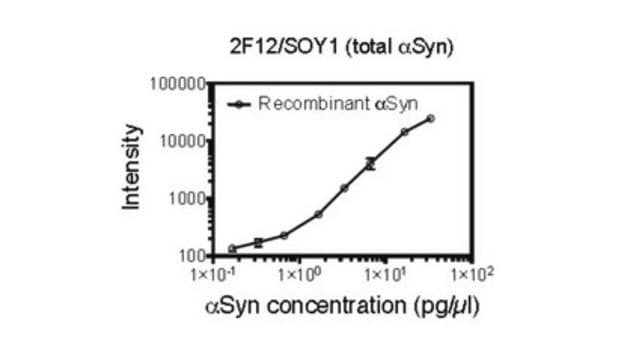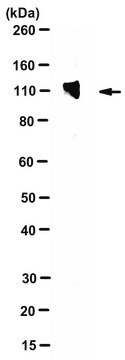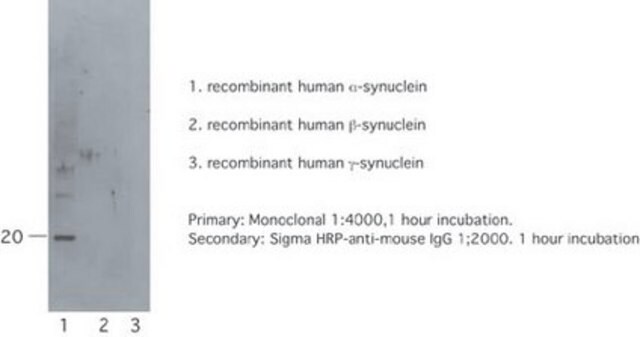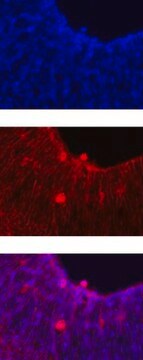推荐产品
生物源
rabbit
抗體表格
affinity isolated antibody
抗體產品種類
primary antibodies
無性繁殖
polyclonal
物種活性
human
包裝
antibody small pack of 25 μg
技術
immunocytochemistry: suitable
immunohistochemistry: suitable
immunoprecipitation (IP): suitable
western blot: suitable
同型
IgG
NCBI登錄號
UniProt登錄號
目標翻譯後修改
unmodified
基因資訊
human ... SNCA(6622)
一般說明
Alpha-synuclein (UniProt: P37840; also known as Non-A beta component of AD amyloid, Non-A4 component of amyloid precursor, NACP) is encoded by the SNCA (also known as NACP, PARK1) gene (Gene ID 6622) in human. Alpha-synuclein is abundantly expressed in the brain and is found in a classic amyloid fibril form within the intra-neuronal Lewy body deposits of Parkinson′s disease brains. The physiological function of synucleins is not well understood, but appears to involve membrane interactions, and in particular reversible binding to synaptic vesicle membranes. It may also be involved in the regulation of dopamine release and transport. It is also reported to reduce neuronal responsiveness to various apoptotic stimuli, leading to a decreased caspase-3 activation. Genetic alterations of SNCA gene is reported to result in aberrant polymerization into fibrils, which is associated with several neurodegenerative diseases (synucleinopathies). Alpha-synuclein is also sown to serve as a substrate for asparagine endopeptidase (AEP) that cleaves it at N103 in an age-dependent manner. This cleavage triggers alpha-synuclein aggregation and neurotoxicity, which leads to the loss of dopaminergic neurons. Higher activity of AEP has been shown in subjects with Parkinson s disease and knockout of AEP is reported to ameliorate pathological effects of alpha-synuclein in animal models. Mutations in SNCA gene are also known to Parkinson′s disease characterized by bradykinesia, resting tremor, muscular rigidity and postural instability. The pathology of Parkinson s disease involves progressive loss of dopaminergic neurons in the substantia nigra and the presence of Lewy bodies in surviving neurons in various areas of the brain. (Ref.: Zhang, Z et al., (2017), Nat. Struct. Mol. Biol. 24(8); 632-6420).
特異性
This rabbit polyclonal antibody detects human alpha-synuclein N103 fragment.
免疫原
Epitope: C-terminus
KLH-conjugated linear peptide corresponding to nine amino acids that precede the asparagine endopeptidase (AEP)-cleavage site at N103.
應用
Anti-alpha-synuclein N103 fragment Antibody, Cat. No. ABN2260, is a highly specific rabbit polyclonal antibody that targets alpha-synuclein and has been tested for use in Immunocytochemistry, Immunohistochemistry, Immunoprecipitation, and Western Blotting.
Research Category
Neuroscience
Neuroscience
Western Blotting Analysis: A representative lot detected alpha-synuclein N103 fragment in Western Blotting applications (Zhang, Z., et. al. (2017). Nat Struct Mol Biol. 24(8):632-642).
Immunoprecipitation Analysis: A representative lot detected alpha-synuclein N103 fragment in Immunoprecipitation applications (Zhang, Z., et. al. (2017). Nat Struct Mol Biol. 24(8):632-642).
Immunocytochemistry Analysis: A representative lot detected alpha-synuclein N103 fragment in Immunocytochemistry applications (Zhang, Z., et. al. (2017). Nat Struct Mol Biol. 24(8):632-642).
ELISA Analysis: A representative lot detected alpha-synuclein N103 fragment in ELISA applications (Zhang, Z., et. al. (2017). Nat Struct Mol Biol. 24(8):632-642).
Immunohistochemistry Analysis: A representative lot detected alpha-synuclein N103 fragment in Immunohistochemistry applications (Zhang, Z., et. al. (2017). Nat Struct Mol Biol. 24(8):632-642).
Immunoprecipitation Analysis: A representative lot detected alpha-synuclein N103 fragment in Immunoprecipitation applications (Zhang, Z., et. al. (2017). Nat Struct Mol Biol. 24(8):632-642).
Immunocytochemistry Analysis: A representative lot detected alpha-synuclein N103 fragment in Immunocytochemistry applications (Zhang, Z., et. al. (2017). Nat Struct Mol Biol. 24(8):632-642).
ELISA Analysis: A representative lot detected alpha-synuclein N103 fragment in ELISA applications (Zhang, Z., et. al. (2017). Nat Struct Mol Biol. 24(8):632-642).
Immunohistochemistry Analysis: A representative lot detected alpha-synuclein N103 fragment in Immunohistochemistry applications (Zhang, Z., et. al. (2017). Nat Struct Mol Biol. 24(8):632-642).
品質
Evaluated by Western Blotting in GFP-alpha synuclein N103.
Western Blotting Analysis: 2 µg/mL of this antibody detected alpha-synuclein N103 fragment in GFP-alpha synuclein N103.
Western Blotting Analysis: 2 µg/mL of this antibody detected alpha-synuclein N103 fragment in GFP-alpha synuclein N103.
標靶描述
~38 kD observed (GFP Fusion protein); 14.46 kDa calculated. Uncharacterized bands may be observed in some lysate(s).
外觀
Affinity Purified
Format: Purified
Purified rabbit polyclonal antibody in PBS with 0.02 mg/ml sodium azide and 40% glycerol.
儲存和穩定性
Stable for 1 year at -20°C from date of receipt.
Handling Recommendations: Upon receipt and prior to removing the cap, centrifuge the vial and gently mix the solution. Aliquot into microcentrifuge tubes and store at -20°C. Avoid repeated freeze/thaw cycles, which may damage IgG and affect product performance.
Handling Recommendations: Upon receipt and prior to removing the cap, centrifuge the vial and gently mix the solution. Aliquot into microcentrifuge tubes and store at -20°C. Avoid repeated freeze/thaw cycles, which may damage IgG and affect product performance.
免責聲明
Unless otherwise stated in our catalog or other company documentation accompanying the product(s), our products are intended for research use only and are not to be used for any other purpose, which includes but is not limited to, unauthorized commercial uses, in vitro diagnostic uses, ex vivo or in vivo therapeutic uses or any type of consumption or application to humans or animals.
未找到合适的产品?
试试我们的产品选型工具.
Takashi Ohgita et al.
Scientific reports, 12(1), 6770-6770 (2022-04-28)
Aggregation of α-synuclein (α-syn) into amyloid fibrils is closely associated with Parkinson's disease (PD). Familial mutations or posttranslational truncations in α-syn are known as risk factor for PD. Here, we examined the effects of the PD-related A30P or A53T point
我们的科学家团队拥有各种研究领域经验,包括生命科学、材料科学、化学合成、色谱、分析及许多其他领域.
联系技术服务部门


